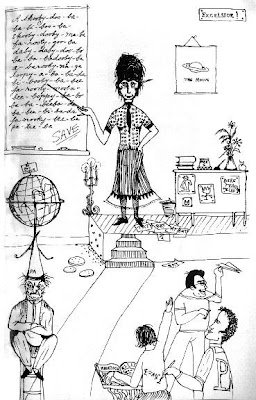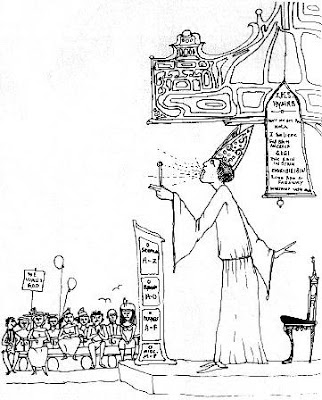Books

Memoir of a Non-Irish Non-Jew, 99 pages (paperback $999,999.99) by Richard May
What is our identity, if we awaken in the moment?
Memoir of a non-Irish non-Jew isn't about being Irish and Jewish or non-Irish and non-Jewish. It is about the chase of tracking down one's ancestral origins, whatever they may be, and the delightfully quirky unexpected discoveries that await you along the way, no matter what your family origins. "You are a link in the chain of your blood. Be proud of it, it is an honor to be this link," G. I. Gurdjieff. But it's also about learning not to identify with the achievements and failing of one's ancestors or even with one's own carefully crafted persona. "What do I have in common with the Jews? I don't even have anything in common with myself, " Franz Kafka. Who are we? Remembering with awareness of various levels of irony the response of Bodhidharma, the Indian monk who brought Buddhism from India to China, to King Wu's question, "Who are you?" — "I don't know"! What is our identity, if we awaken in the moment from the stories of our lives and the dreams of our culture?
http://www.lulu.com/content/803771

Paradise Emporium -- a collection, 247 pages - $9.48
by CL Frost
This newly released collection by a versatile, highly
skilled writer and artist includes short stories in the science
fiction, fantasy, magical realism and speculative genres. Among
these is the short story from which the collection derives its
title as well as many fine poems and a huge assortment of visual
artistry that also covers a wide variety of genres.
http://www.lulu.com/browse/book_view.php?fCID=561988

World of Villages: A Six-Year Journey Through Africa and Asia,
499 pages - out of print, but used copies are
readily available at very reasonable prices.
by Brian Schwartz.
The author traveled with, and stayed among, the native villagers
everywhere he traveled throughout Africa, Asia, and Indonesia
getting to know the strange behaviors of strange peoples.
Published in 1986 by Random House ISBN: 0517558157
Also published as Travels Through the Third World by
Macmillan ISBN: 0283992123
Brian Schwartz also wrote China Off the Beaten Track
- How to do it on your
own, published by St. Martin's Press ©1983 Library of
Congress # 82-61428. Copies of this book are also readily
available.

Aberrations of Relativity, 201 pages - $15.00
by Fred Vaughan
This is a collection of articles that emphasize one the most observable
aspects of relative motion, i. e., aberration effects. There are many
informative diagrams and illustrations with many new insights. What the
author calls "observational relativity" is defined in this book as a
possible alternative to Einstein's special theory.
The reader will gain valuable insights into all aspects of relativity
including why Einstein considered it necessary to embrace time dilation
and length contraction in his special theory, and why that might very
well not have been necessary.
The book is written for the intelligent (maybe very intelligent) layman,
with little in the way of advanced mathematics required to fully
comprehend the discussions.
http://www.lulu.com/content/572819

In Proust's Footsteps, 99 pages (hardcover $22.40)
by Maria Claudia Faverio
"In Proust's Footsteps" is Maria's fifth poetry book after "Entropy",
"Behind the Mask", "Metaphors instead of Formulas", and her "Selected
Poems" collection. Maria is a committed, award-winning poet whose books
are highly recommended by the Poetic Genius Society. Maria is also the
current editor for poetry and prose of the International Society for
Philosophical Enquiry.
http://www.lulu.com/content/430375
Learn about this talented Australian author, poet, and artist as well as her many creations of prose, poetry, classical music CDs, puzzle books, fairy tales, and artistic images at the following site: http://www.lulu.com/mycreations.

NATAN, 108 pages - $13.69
by Albert Frank and Muriel Hustin
Nath is a genius, Tanguy an idiot. Any such extremes disturb people. In
recognition of this fact, a pharmaceutical corporation is undertaking
experiment with a new drug, ?normality pills?, that would move them both
toward the norm. It is decided to put them in contact using e-mail
exchanges. Those responsible for the experiment will monitor the
exchanges. So a deep friendship evolves between two individuals who
normally would never have even met. Their dialogue is moving right up to
the terrifying conclusion. One of the themes of the narrative is the
loneliness of the extremes.
http://www.lulu.com/content/71060

Losing Faith in Faith: From Preacher To Atheist, 342 pages - $25.00
by Dan Barker
After 19 years of evangelical preaching, missionizing, evangelism and
Christian songwriting, Dan Barker "threw out the bathwater and
discovered there is no baby there." Barker describes the intellectual
and psychological struggle required to move from fundamentalism to
freethought. Sections on biblical morality, the historicity of Jesus,
bible contradictions, the unbelievable resurrection, and much more. This
book is an arsenal for skeptics and a direct challenge to believers.
http://ffrf.org/shop/books/details.php?cat=fbooks&ID=FB5

The Magic of Ed Rehmus, 192 pages - $15.00
by Ed Rehmus (edited by Fred Vaughan)
This collection of creations by Edward Rehmus includes essays, artwork,
poetry, linguistic studies, comics, and puzzles. The style of Ed
Rehmus' prose is reminiscent of H. L. Mencken in his hay day. As a
friend said of Ed in eulogy, "He went for the bones of what he was
considering and the stormy winds could make off with the sails if that
was a consequence!" On his own behalf Ed had said, "What indolence and
what prodigality to trust to usage that which ought always to be
spontaneous, creative and conscious: speech!"
http://www.lulu.com/content/476575 - regular price.



















